"People who love classical music and people who love games are totally different types of people," says Eternal Sonata scenario creator and director Hiroya Hatsushiba, of development studio Tri-Crescendo. "I wanted people who love games to listen to Chopin’s music so I put him in the centre of this story."
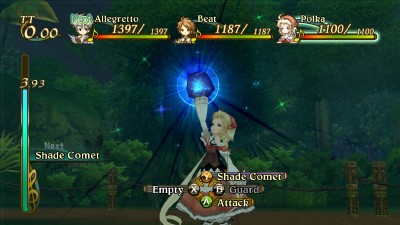
A worthy aim, but Hiroya's solution is a touch unconventional. In the game Eternal Sonata, which will launch for Xbox 360 on 19 October, the famed Polish composer gets the anime treatment by dying - as he succumbs to tuberculosis, he slips into a coma and enters a dream world of music-themed fantasy.
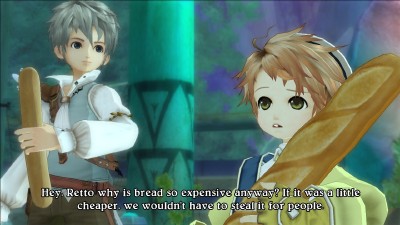
The Japanese background and anime influence is obvious in the design, a striking combination of cel-shaded world overlaid with high-definition detail that looks like nothing else we've seen. Not unsurprisingly, it’s all done to a backdrop of tunes by and inspired by Chopin and with a heavy music motif throughout.
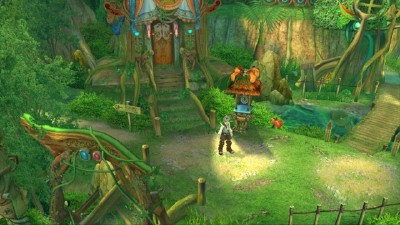
The combat system is as unique as the setting, built around time limits and light levels rather than the size of fantasy sword. The abilities of your character and those it’s attacking change depending on whether you're in light or shade and you've only got so many seconds to mount an attack, so your movements around the haunted-forest battlefield have to consider how far you can travel and how you can tempt enemies into a spot that benefits you.
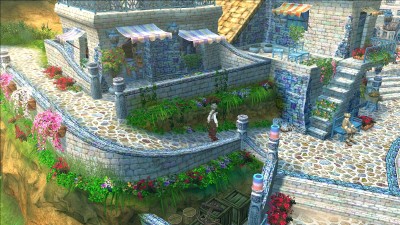
Between that, the design, and the musings on loss and mortality it's a truly fascinating creation, and all the rarer on the Xbox 360 - a console thus far typified by games built around lantern-jawed men clutching suspiciously Freudian weaponry.
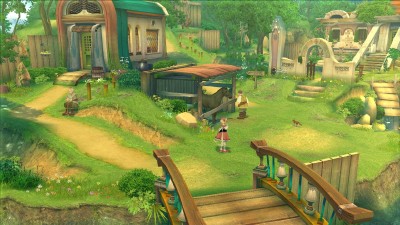
It's already had a positive reception in Japan. Hiroya Hatsushiba here kindly answers some of our other questions about its development:
SFX: Why do you think RPGs continue to be so popular?
Hiroya Hatsushiba: "The story is a very attractive factor for movies and novels, and users can enjoy the deeper stories within RPGs as well. You are able to visit many varied places in the game world. The battle system includes facets such as strategy and action. So the RPG genre is the one most able to deliver a complete gaming experience."
Sign up to the SFX Newsletter
Get sneak previews, exclusive competitions and details of special events each month!
SFX: How will your game captivate gamers who have not previously played many RPGs?
HH: "It is necessary for developers to help players easily understand complicated control systems and rules of the games. When we started to develop Eternal Sonata, we set an important goal which is to make people aware of how fun it is to play this game within the first ten minutes. The battle system is immediately comfortable to play. The Eternal Sonata demo will be in Xbox Live very soon, so please try it out and see for yourself."
SFX: One of the biggest factors that can make or break an RPG is the combat system. Can you briefly explain how yours works?
HH: "The most important concept was to be able to learn the battle system quickly. We needed to simplify the controls. However, this reduces the potential variety within battles so we came up with the idea of each special move behaving differently in light and dark places. Also, we created enemies that will change their forms depending on whether they are in light or dark places. I feel that we brought a new type of variety and strategy to the battles with this feature."
SFX: You said at the Leipzig Game Convention that the first play of the game would take around 30 hours, with more content available to unlock, which would make subsequent plays last longer. What are the challenges of making such a long game?
HH: "A very important thing is not to bore players. Especially in the battle system, where we added different factors bit by bit as the game moves along to keep things fresh. Of course, we had to make many locations for the adventure as well. However, 30 hours play is not so long for an RPG so we didn’t think it was that challenging."
SFX: The game is inspired by anime, but what would you most liken your game to?
HH: "The graphic style is similar to anime but we feel that the way we expressed ourselves was very unique. It is like blending realism and anime. Therefore, the answer would be, 'I don’t know.'"
SFX: Did you do much research into Chopin’s life and work to help you prepare the game?
HH: "It is a shame that some people don’t have a chance to listen to the great music of Chopin. When we were creating this game, we took references from books and the internet so that people who were not previously interested in Chopin at all can get into the game easily."
SFX: The game deals with a fairly sensitive topic, that of terminal illness. How is this used in the story?
HH: "Human lives are all of a limited time but normally people don’t like to think about this sort of thing. If you are ill and realise your life is near to an end, you will probably think about what life means deeply for the first time. This game’s theme is 'life' so I wanted players to think about this. However, we didn’t intend to emphasize the tragic side of the story."
Eternal Sonata will be published by Atari . You can read about this and other anime-style games in our Total Anime special (on sale 28 September) and see the official SFX review in issue 164 of the main magazine. Visit the official Eternal Sonata site here .
Questions by Tim Coutts, additional research and text by Jon Hicks.
SFX Magazine is the world's number one sci-fi, fantasy, and horror magazine published by Future PLC. Established in 1995, SFX Magazine prides itself on writing for its fans, welcoming geeks, collectors, and aficionados into its readership for over 25 years. Covering films, TV shows, books, comics, games, merch, and more, SFX Magazine is published every month. If you love it, chances are we do too and you'll find it in SFX.


